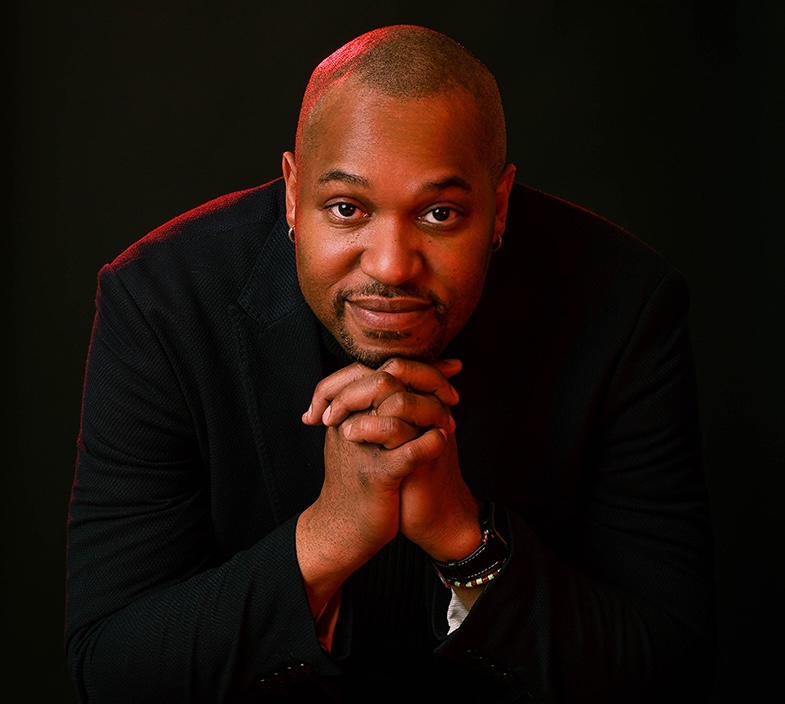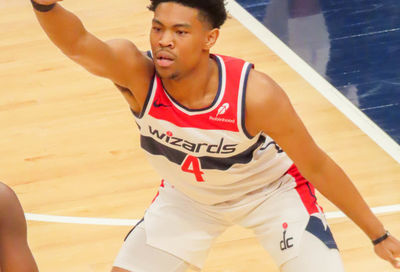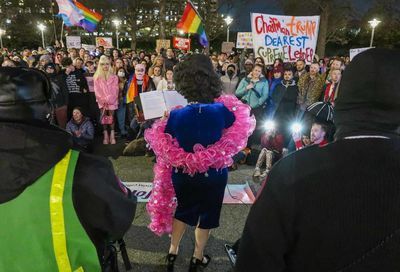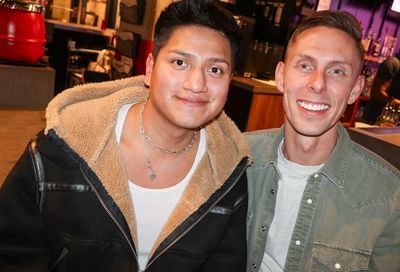A Touch of Lace
Linda McAllister is living her dream, for herself and her community
Stepping off the Rhode Island Avenue sidewalk and into Lace for the first time, it’s easy to imagine what Alice must’ve felt falling down the rabbit hole. Following a top-to-bottom renovation, this one-time Northeast tattoo parlor is now a welcoming oasis of chandeliers, throw pillows and other sophisticated accoutrements. The spotless, unisex bathrooms are also a welcome touch.
Linger on the ground floor for a drink at the sleek bar, or take a table for dinner. The cozy underground is perfect for intimate dancing, or maybe an aperitif while lounging on a VIP Room sofa.

Linda McAllister
(Photo by Todd Franson)
As with any well-set stage, however, there is always someone behind the scenes doing the heavy lifting. In the case of Lace, it’s Linda McAllister. The 48-year-old North Carolina transplant — by way of Texas — has put her all into the space. That’s on top of her day job, putting her master’s of social work to use. So while the patrons — primarily women — stop by to slow down, McAllister is behind the curtain making sure it all runs smoothly. Ask her whether she has boundless energy or if she’s exhausted and she’ll answer in a word: “Both.”
“My hobby is Lace,” she says with a cheery laugh, adding that a good run helps to clear her mind — when she can find the time. “Right now, my universe really is Lace and work.”
Despite the demands of owning a restaurant and lounge, which she bills as “the hottest new women’s lounge on the East Coast,” McAllister seems happy. After all, this is a woman who fondly remembers being a little girl during the 1970s and thinking that if she could cash in on the Watergate hype with Watergate-tape candy for kids, she’d make a killing.
While McAllister may have a penchant for thinking about what people want — entrepreneur on one hand, empathetic social worker on the other — she’s also interested in what most need: community. And that’s what she’s hoping to create with Lace, opening her venue to community groups such as the Gertrude Stein Democratic Club, DC Black Pride or Women In The Life. Now she’s adding a movie night, and a men’s night. More than a hotspot, more than fine dining, more than the perfect groove or libation, what McAllister wants is for the community — lesbian, gay, women, men, black, white, on and on — to feel at home at Lace.
METRO WEEKLY: How did you end up in Washington?
LINDA MCALLISTER: I moved to Washington from San Antonio, Texas. I went to undergraduate school in San Antonio, Our Lady of the Lake University. I got a bachelor’s degree in social work and stayed in San Antonio for a little over eight years.
Then, one day, I decided, ”Well, I’m not a Texan, although this has been a great experience.” I’m originally from North Carolina, and I did not want to move back to my little town in North Carolina. I had some relatives who lived here, and decided, ”Why not?” I have a twin sister, and she’s an attorney in Maryland. I have some cousins and an aunt who reside here. And I just felt my time in Texas was over. I saved my money – bizarre as it sounds – rented a U-Haul, got an apartment, looked for a job and that was that. I moved to Washington in 1995.
MW: Just how small was that town in North Carolina?
MCALLISTER: Willard, N.C. We don’t have a stoplight. But it’s a great small town. I was actually born in Brooklyn, N.Y. My mother just felt it wasn’t the best environment. She wanted a small, kind of country living for us, and we moved to North Carolina. I was a baby – maybe 2 or 3.
Willard is 30 miles from Wilmington, from the coast. It’s a small, very nurturing town. Everyone knows each other’s families. I tell people all the time that I grew up in Mayberry. When we’d have a package from the post office, our mailman would just go inside our house and leave the package on our kitchen table. We never locked our doors.
MW: San Antonio must’ve been a big adjustment for you.
MCALLISTER: Oh, significantly. My personal items – books, my purse – I would just leave them out. People would say, ”Linda, don’t do that.” And I would say, ”Why? They’re not their items.”
MW: Where did you settle in this area?
MCALLISTER: I live in this quadrant, in Brookland.
MW: You said Willard was like Mayberry. That was my first impression of Brookland.
MCALLISTER: That’s the reason I chose to live in that area. Not growing up in a big city, when I first saw a row house I really didn’t know what to make of it. [Laughs.] I talked with my real-estate agent and said, ”I just want a house on a lot with a big yard.” The universe allowed that.
MW: Coming to D.C. from San Antonio, there must’ve also been some big differences, relative to their LGBT communities, particularly.
MCALLISTER: San Antonio was actually more open and expansive, because of the larger Hispanic population, then the smaller African-American population, and also the military base. It seemed like there was less division. You would go to an establishment and there would be people of all different types and you had a great time. To my surprise, it seemed when I moved here to Washington – thinking this is the nation’s capital, lots of people with advanced degrees, very enlightened – it seemed like many of the engagements I had were filtered through the prism of race, in terms of where gay blacks party. I am still, to this moment, puzzled by that.
MW: Are you hoping to break down any of those divisions with Lace?
MCALLISTER: Absolutely, absolutely. I did this precisely to bring the community together, to have a space where people can come and feel comfortable – women, in general, but Lace is open to the gay and lesbian community as a whole. I have people who’ll ask, ”My brother is in town, but he’s straight. Can he come?” Absolutely!
We’re all individuals, yes. We all have our differences. But we have more things in common than we have things that divide us. When I first opened, I was peppered by the question, ”Is this a black, lesbian club?” I would say no, it’s not. It’s a women’s establishment more so than even lesbian. I opened this for the lesbian community and everyone’s welcome.
MW: What sorts of challenges did you have getting Lace open?
MCALLISTER: When I decided that I was going to move forward – that I could accept doing this and not being successful, more than not doing it all and wondering – I said, ”All right, Linda, now it’s time to find an actual space.” That was one of the most challenging experiences I had.
I found a building that I purchased, and when you’re purchasing commercial property the folks selling it are not going to wait until you get the liquor license. ”You want to buy this space or not?” I thought I had done all my due diligence in terms of the liquor license, etc. But the people in the neighborhood did not want it. It wasn’t even the lesbian aspect, which quite frankly I didn’t publicize too much. It was just the fact that many of the neighborhoods in Washington, when it comes to liquor licenses, are not very business-friendly at all. They protested my license and I didn’t get it. So then I had this building that I’d paid several hundred thousand dollars for.
MW: Where was that?
MCALLISTER: Well, this was a part of the city that probably would’ve done very well to have an establishment with a restaurant orientation. I was a bit taken aback that many neighborhood people state that they want to encourage not only businesses in the neighborhood, but, more precisely, people of color to open businesses. They were just so unwilling to even hear my perspective and to at least give me an opportunity to tell them what I was bringing to the community.

Lace
(Photo by Todd Franson)
But because I believe all things occur at the time that they are supposed to and that the universe has its own order, I’m very happy that it did not move forward. It would’ve been a bit more difficult to get people over to that part of the city. It was a blessing in disguise. What I did after my hair became a little grayer was I said, ”Okay, Linda, it’s time to sell the building.” Thank goodness the market, about seven years ago, was different than it is now. I put the building on the market, I made a profit, and I was able to buy this one.
MW: This renovation must’ve been a big part of your business plan.
MCALLISTER: This had been a tattoo parlor. You could barely move downstairs. I did a total renovation of the building. Once the liquor license was granted, I went through the whole permitting process, getting all the licenses. I had a pretty good idea of how I wanted it to look. I knew I wanted the space to be very pretty, sexy and upscale. And feminine – with the awareness that there are lots of different types of femininity along a gradation. In order to make that come to fruition, I hired an interior designer.
There’s a place in Baltimore I’d looked at for furnishings. They recommended the designer: Lynn Coffland of Coffland Designs. When she and I met, I instantaneously felt the connection with her. I had interviewed a number of interior designers, but when I met her I knew she was a person that could make my vision come to life, and we moved forward. The renovation went so incredibly smoothly that I knew that it was just the universe speaking, saying, ”This is the right thing to do.”
MW: When did you open?
MCALLISTER: My opening day was Nov. 15, 2008.
MW: When you walk through Lace, you must get goose bumps sometimes.
MCALLISTER: I do. I feel grateful to the universe that I’ve been able to open an establishment where I feel honored when I walk in, and other women express to me how pleased and how honored they feel. I feel a sense of calmness and a sense of, yes, it’s a space that women, that people in general, can come together and just be able to engage with each other, just have a sense that we’re all human beings.
MW: Beyond Lace, looking at the community more broadly, you’re a sponsor of DC Black Pride this year?
MCALLISTER: Lace is a sponsor. There are very few lesbian-owned establishments, owned by a person of color. They came to me and said they felt a special pride in being able to have Lace as a sponsor and to have events here.
MW: Do you have any interest in joining the board, getting more involved? Would you even be able to find the time?
MCALLISTER: I certainly want to offer my skills or my expertise, time, in any fashion to the gay and lesbian community if they feel that I have something to offer. I certainly wouldn’t rule it out, being on the board. But how about, ”in some capacity”? Right now I’ve pretty much got my hands full! [Laughs.]
MW: DC Black Pride isn’t hugely political, but I’m wondering if you might have some interest in politics. You did move to D.C. after all.
MCALLISTER: I consider myself a very political person. Politics has a direct connection to how people live, to what opportunities people have. Here in Washington, in some ways it seems very progressive in terms of encouraging business growth and encouraging the expansion of the city. Then, on some level, they seem to be almost retracting. Down the road, quite some time from now, there are some ideas I have regarding what I could offer in a political arena.
MW: Running for an ANC seat, maybe?
MCALLISTER: It would be prudent to start at the very grassroots, local level, to get a feel for how I could best move forward. But I’m crazy enough to believe that, yeah, there are some political ideals that I feel very passionate about – as passionate as I feel about Lace.
It’s pretty simple to me. I believe in human rights. People – no matter where you live, your race or ethnicity, disability – should have the right to live in a free society. One of the aspects of this country that I absolutely love is the ability of people to make choices. Entrepreneurship. Private enterprise. Letting the market decide. That rings very strongly for me.
MW: Are you a Republican? A libertarian?
MCALLISTER: We are very fortunate to live in a country that has the best standard of living – for the most part; there are some challenges, but for the most part – of anywhere in the world. I believe there is a direct link from that to our private-enterprise system. Even though there need to be checks and balances on that, I think that when you do not allow businesses to flourish you have neighborhoods that are stagnant. You have cities that are stagnant. You don’t have growth, the ability for people to really understand … their ability to move their lives forward.
MW: Do you identify with a party or political philosophy?
MCALLISTER: I cannot identify completely in either camp. There are some aspects of the Democratic philosophical bent of social welfare that I don’t subscribe to. And there are some aspects of the Republican perspective of free rein of business that I think need some parameters as well. I guess my philosophy would be allow people to make their own choices in the context of what is best for the individual, but also how they can improve the larger society.
MW: That sounds ”moderate.”
MCALLISTER: Yeah, I guess I am. Full disclosure: I’m probably more on the R side than the D side. That disturbs people sometimes.
MW: Even if you lean to the R, you must be a fan of President Obama. You’ve got that framed photo of him by the front door.
MCALLISTER: President Obama has the most difficult job, I think, in the history of the presidency – the economy almost going off the cliff, just keeping the country moving forward. I have a lot of admiration for him. He is clearly supportive of the gay and lesbian community. I think he’s doing it in the most politically appropriate way that he can to eliminate ”Don’t Ask, Don’t Tell.” I’m going to give him time to do that. Some things are kind of a straight line: You do it and you move forward. There are other things best done in incremental stages.
MW: Speaking of stages, I haven’t asked you about an important one: coming out. Were you aware that you were a lesbian by the time you moved to San Antonio?
MCALLISTER: I think that was what prompted me to move away from home, frankly.
MW: There wasn’t a big lesbian scene in Willard?
MCALLISTER: No, not a big lesbian scene in Willard. [Laughs.] I was about 12 or 13, probably sitting in class, when I realized there was this particular girl who, every time she took a class, I took that class just so I could look at her. I thought, ”Hmm…. I wonder what that’s about?” I’m a voracious reader, so I read a few things and realized, ”Oh, my goodness. That’s what this is.” So to really be able to experience, have a clearer understanding, and just not have the pressure of my family…. Plus, I wanted to go away to college anyway.
MW: How did your family react?
MCALLISTER: My family is pretty supportive. My sister was living in New York at the time. When I was in San Antonio, about three years into my stay, I called her and explained, ”Brenda, guess what? I’m gay!” My sister really had a lot of challenges with it, being my twin. It took quite some time for her to understand that it certainly did not negatively impact our relationship. She’s fine with it now, but it took quite some time.
MW: Was it easier for your parents?
MCALLISTER: My father was deceased prior to my coming out. I did tell my mother. They’re traditional Southerners. My mother didn’t quite know how to react. It was the traditional, ”Was it me? Did I do something?” But once she realized that I was still going to do the things that I had always wanted to do – go to college, be a productive citizen – and then meeting some of my girlfriends…. It’s not that she shouted for joy. But at this juncture, she brings up gay marriage. She’ll say things like, ”Linda, in church the other day the pastor said something negative about gay people and I just thought it was wrong.” This is my 80-something-year-old mother saying this. And I say, ”Yeah, Mom, that’s good. People need to be more open.” And she says, ”I think you’re right.”
Frankly, I was more surprised that I wasn’t unnerved by the realization of being a lesbian. It was just something that, once I understood, once I read more, I had an understanding that it didn’t have anything to do with not being a good person or embracing my own femininity — which I love – I was okay with it.
MW: Returning to Lace, you recalled how lucky you were with that first property, that you were able to re-sell it when the market was still hot. Maybe you’re not so lucky in that you’ve opened a business smack in the middle of the worst economic downturn since the depression. How do you manage?
MCALLISTER: I’m always in the posture of learning. Even when I would like for things to be a bit more positive on the revenue side, I realize that, okay, I can learn something from this experience, hopefully to grow the business. The major satisfaction that I get is, on a nightly basis, at least two, three, four women will come up to me and say, ”Linda, thank God you did this. We needed this. We needed this space.” So I don’t necessarily worry too much about the revenue side. Though, obviously, that’s important. But I feel if I keep providing a space where women feel comfortable, then everything else will come after that.
Lace Restaurant and Lounge is at 2214 Rhode Island Ave. NE. Call 202-832-3888 or visit lacedc.com.
Support Metro Weekly’s Journalism
These are challenging times for news organizations. And yet it’s crucial we stay active and provide vital resources and information to both our local readers and the world. So won’t you please take a moment and consider supporting Metro Weekly with a membership? For as little as $5 a month, you can help ensure Metro Weekly magazine and MetroWeekly.com remain free, viable resources as we provide the best, most diverse, culturally-resonant LGBTQ coverage in both the D.C. region and around the world. Memberships come with exclusive perks and discounts, your own personal digital delivery of each week’s magazine (and an archive), access to our Member's Lounge when it launches this fall, and exclusive members-only items like Metro Weekly Membership Mugs and Tote Bags! Check out all our membership levels here and please join us today!
























